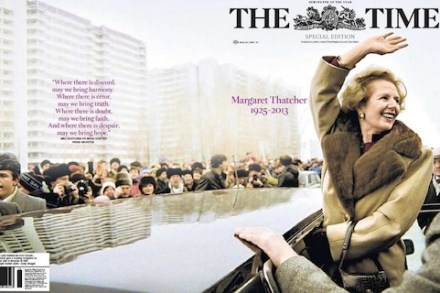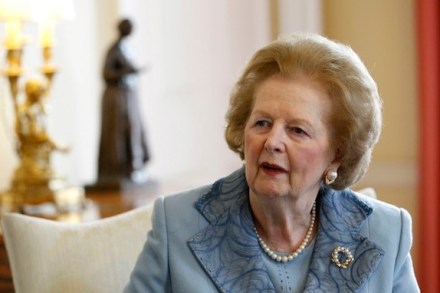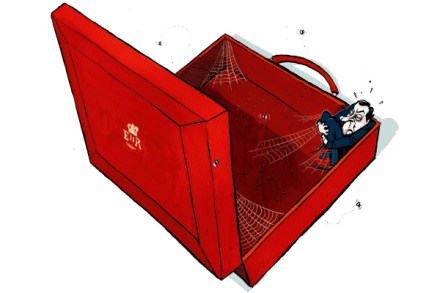Papers mark Thatcher’s death
Tomorrow’s newspapers pay tribute to Margaret Thatcher, some praising her for changing Britain for the better, others nodding at her ability to divide opinions, even in death.

Tomorrow’s newspapers pay tribute to Margaret Thatcher, some praising her for changing Britain for the better, others nodding at her ability to divide opinions, even in death.

‘For many of us, she was, and is, an inspiration’, David Cameron said of Margaret Thatcher in his tribute to her. It was him, firmly — and proudly — placing himself in her tradition. Cameron has moved in Thatcher’s political direction as leader. He has become —partly, through circumstance and necessity — less interested in being a unifying figure, and more interested in getting things done. There has, in recent years, been an end to any attempts to distance the party from her legacy. Thatcher’s life-story is a truly remarkable one. Cameron rightly dwelled on the sexism she had to take on to become Tory leader. But she also had

Today we lost a great leader, a great Prime Minister and a great Briton. Margaret Thatcher didn’t just lead our country – she saved our country. And we should never forget that the odds were stacked against her. She was the shopkeeper’s daughter from Grantham who made it to the highest office in the land. There were people who said she couldn’t make it; who stood in her way; who said a woman couldn’t lead. She defied them all. She fought her way to a seat in Parliament…to the leadership of her Party…and then to lead our country…winning the backing of the British people three times in a row. She will be remembered for

The political tributes and barbs cast after the news of Margaret Thatcher’s death have been covered on Coffee House today, but what of the world’s other great egos: those in showbiz? Steerpike was impressed by Meryl Streep, who having played Thatcher in the controversial 2011 biographical film ‘The Iron Lady’, is slightly better placed than her Hollywood comrades to pass comment. Streep told the Washington Post: ‘to me she was a figure of awe for her personal strength and grit,’ and while she acknowledged Thatcher’s detractors, the actress has some rather sound opinions: ‘Her steadfast, almost emotional loyalty to the pound sterling has helped the UK weather the storms of European

There is a poignant passage in Margaret Thatcher’s memoirs during which she contemplates her failure in Scotland. She seemed puzzled by this, noting that, in her view, many of her ideas and principles had at least some Caledonian ancestry. And yet, despite her admiration for David Hume and, especially, Adam Smith, there was no Tartan Thatcherite revolution. Sure, there were some true believers – Teddy Taylor, Michael Forsyth – but Scotland never warmed to the Iron Lady. And she never quite knew or understood why. Two issues, above all, led to her downfall. Europe and the Poll Tax. The former was a Westminster affair and a matter of internal internecine


In 1983, a Spectator piece argued that ‘the most faithful followers of the Thatcher cult are to be found within the Labour Party’. Baroness Thatcher’s passing was always going to be as much of a test for the Left as it would be a sad day for the Right. The Labour leadership knew this, and took care to craft statements and tweets which, while acknowledging the glaringly obvious political differences, praised Thatcher the woman. The party has suspended its political campaigning ahead of the local elections as a mark of respect. Ed Miliband’s tribute in particular made clear that he had no sympathy with those in his party tempted to

Margaret Thatcher was always the candidate from the outside, both because of her background and because of her sex, and so it was an extraordinary event in the middle of the 1970s that what was considered the stuffiest of the political parties chose her and once that had happened, of course it was transformative. It was transformative, not only for the Conservative party but much more importantly for the country. Her approach to industrial relations was very controversial. The model that the Tories tended to have at that time was that you had to have some sort of compact with the union leaders in order to hold wages down and

“I don’t think there will be a woman Prime Minister in my lifetime.” – 1975 ‘To those waiting with bated breath for that favourite media catchphrase, the U-turn, I have only one thing to say. You turn if you want to. The lady’s not for turning.’ ‘I always cheer up immensely if an attack is particularly wounding because I think, well, if they attack one personally, it means they have not a single political argument left.’ ‘If you want something said, ask a man. If you want something done, ask a woman.’ ‘I am extraordinarily patient, provided I get my own way in the end.’ ‘To cure the British disease

Margaret Thatcher is the most significant British political figure of the past 50 years. In her time in office, she transformed the British economy, promoted the vigorous virtues and offered strength and support to the dissidents of Eastern Europe and. On top of all this, she was — of course — Britain’s first female Prime Minister. In future, people will find it hard to believe just how nationalised Britain’s economy was before the Thatcher revolution. As she said in her 1982 conference speech, ‘How absurd it will seem in a few years’ time that the State ran Pickford’s removals and Gleneagles Hotel.’ With the benefit of hindsight, it is easy

The Spectator was the only national publication to fully support Margaret Thatcher in the first ballot of the Tory leadership contest. Patrick Cosgrave explain why in this political column from 23 January 1975: If I start with a reference to the sorry condition of the Tory Party, I hope readers will not immediately turn to another page, on the grounds that this record has been played too often. For I want to add that, if only the Tories can take a fairly cool look at themselves, it will quickly be apparent that the condition is not as serious as all that; and that it is certainly capable of repair. Housman’s ancient

Margaret Thatcher died this morning following a stroke. Downing Street said this afternoon that the former Conservative Prime Minister’s funeral will have the same status as the Queen Mother and Princess Diana, with full military honours, a service at St Paul’s Cathedral, followed by a private cremation. She will not lie in state, in accordance with her wishes. The flag over No.10 is flying at half mast and the tributes are flowing in. David Cameron’s tribute is posted below. Here are some others:- Barack Obama: ‘With the passing of Baroness Margaret Thatcher, the world has lost one of the great champions of freedom and liberty, and America has lost a true
Matt Hancock, the business and skills minister, addressed the Resolution Foundation’s low pay debate this morning, an indication of how seriously the Tories are taking the rising cost of living. He delivered a resounding defence of the minimum wage. He said that the evidence was overwhelming: the minimum wage did not harm employment levels: and declared that the Conservatives should ‘strengthen’ the minimum wage. He said that the minimum wage should be enforced, and hinted that the Low Pay Commission might be reinforced. He said that working more hours was not necessarily the right answer, contrary to those who hold that Britain needs to harder and longer. Beyond that, Hancock proposed

Twenty-five years ago I went to St James’s Palace to ask the Prince of Wales if he would open the new Design Museum. Before us was the model of the building, an elegant, austere, uncompromised white box that was very much along Bauhaus lines. We knew that ‘modern’ no longer meant ‘of-the-moment’ but had become a period style label. Even at the time we acknowledged the layers of irony in this historicist gesture. The Prince, sounding pained, I recall, asked, ‘Mr Bayley, why has it got a flat roof?’ And that was the end of that. Next time it will be different. The Design Museum is moving from a creatively

Ramesh Ponnuru has written a splendid op-ed for today’s New York Times. Splendid, not because it is new or especially original, but because, alas, it’s central message needs repeating until, eventually, even the more dunderheaded class of Republican Congressman hears the message. And it is a simple message. Namely, that asking ‘What would Ronald Reagan do?’ is almost about as useful as mining Martin van Buren, George II or Charlemagne for policy advice that will help solve today’s problems. I exaggerate of course, but only for effect. We are not now as we were then. Or, as Mr Ponnuru puts it: Republicans are very good at tending the fire of

Nigel Lawson described the NHS as the closest thing to a national religion that this country has. The NHS is certainly like a national religion to the extent that it is pretty much impossible to have a rational debate about it. There is often a choice posited between the NHS and no healthcare at all. One can see this mindset in today’s Guardian article on the news that the Thatcher government in 1982 held Cabinet discussions about fundamental rethinking the size and shape of the state. Here is the section on the health service: ‘But the earlier version’s most controversial privatisation proposal concerned the health service: “It is therefore worth

It is testament to Margaret Thatcher’s remarkable influence on British politics that 33 years after she won her first general election victory she still has such a hold on our political discourse. One of the things that the Tory party needs to do is understand both why Thatcher was so successful and how she changed Britain. In an interview with The Spectator this week, Elizabeth Truss, the new education minister who proudly describes herself as a ‘bit of a Thatcherite’, offers an interesting take on the question. Truss argues that ‘what Mrs Thatcher did in the 80s was unleash a lot of forces by things like freeing up credit; getting

George Osborne’s spirited bid in The Times (£) earlier this week to appropriate the Obama victory for the Tories is a curious mirror image of the Labour Party’s arguments to the same effect. Both ignore the reality that the US is the US, not us, and Obama is Obama; formulas for election success aren’t a peel-off/stick-on tattoo, to be transferred between one body politic and another. But the article was interesting for what it told us about the Chancellor himself, quite apart from a slightly nerdy obsession with American elections. The fifth and decisive point in his piece was all about how social liberalism plus fiscal conservatism was the key

Charles Moore’s biography of Margaret Thatcher promises to be the most important British political book in decades. Tonight, we got a preview of it when Charles delivered the Centre for Policy Studies’ second Margaret Thatcher lecture. The subject was Thatcher and Europe. I won’t say too much about it because we’re running a version of it in the coming issue of The Spectator. But one thing that Charles demonstrated was that even when Thatcher was campaigning for British membership of the European Community, as then was, she was never in favour of the European project. One of the other thing that Charles’s lecture brought out was the shift in the

A big-tent turnout on Saturday evening for the fourtieth birthday of Conor Burns, the Tory MP for Bournemouth West. Burns, fresh from his heroic rebellion against Lords reform, packed the State Rooms of the Palace of Westminster with a big crowd of rising Tory stars and some old stagers including Lord Lamont and Sir Mark Thatcher. Burns is a close friend of Baroness Thatcher; and although the great Lady was unable to join, she did some send some pearls of wisdom in her place. Burns reported that when he had told Lady Thatcher that his friend and speech-giver Thomas Docherty, who has been Burns’ voting pair since they both arrived in Westminster

Westminster’s favourite shaggy-haired do-gooder Andrew Mitchell has been spilling his heart out to Total Politics about Maggie: ‘To me, she was a goddess. When she walked down the corridors, I used to stand stiffly to attention and hope she would pass by.’ Far too much information from the International Development Secretary, who is known to keep a bowl of condoms in on his ministerial desk, as part of a worldwide health campaign, of course.
